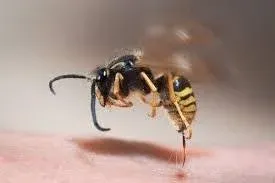A wasp sting can cause sharp, burning pain followed by redness, itching, and swelling. While these symptoms usually fade within a few hours, the pain can feel intense at first. That’s why many people look for the best pain relievers for wasp stings to ease discomfort quickly. Whether you prefer over-the-counter medicine, natural remedies, or simple home treatments, knowing your options helps you recover faster.
Why Do Wasp Stings Hurt So Much?
When a wasp stings, it injects venom containing proteins that affect nerves and immune cells. This venom causes pain, swelling, and itching. For some, the pain is short-lived, but others may experience discomfort lasting for hours. Using proper pain relievers for wasp stings reduces these symptoms and speeds up recovery.
Immediate Steps After a Wasp Sting
Before applying any medicine, it’s important to follow basic first-aid steps:
Remove the stinger if present (though wasps usually don’t leave it behind).
Clean the area with soap and water to prevent infection.
Apply a cold compress for 10–15 minutes to reduce pain and swelling.
These steps prepare the sting site for more effective use of pain relievers for wasp stings.
Over-the-Counter Pain Relievers
Several medicines are widely available and work well to control sting discomfort.
Ibuprofen (Advil, Motrin) – Reduces pain, swelling, and inflammation.
Acetaminophen (Tylenol) – Eases pain but does not reduce swelling.
Aspirin – Helpful for adults but should be avoided in children.
These pain relievers for wasp stings are effective for most mild to moderate cases. Always follow dosage instructions on the packaging.
Antihistamines and Topical Creams
In addition to oral medication, topical treatments help reduce itching and irritation.
Antihistamines (like diphenhydramine) block histamine release and reduce swelling.
Hydrocortisone cream calms redness and itching.
Calamine lotion provides cooling relief and prevents scratching.
Combining these with oral pain relievers for wasp stings offers stronger, longer-lasting relief.
Natural Remedies for Sting Pain
If you prefer natural solutions, several home remedies can help ease pain:
Baking soda paste – Neutralizes venom and reduces burning.
Aloe vera gel – Soothes irritation and cools the skin.
Honey – Has antibacterial and anti-inflammatory effects.
Vinegar or lemon juice – Can neutralize some venom toxins.
While natural treatments may not be as powerful as medication, they are safe, accessible, and effective for mild stings.
When Pain Becomes a Concern
Most stings heal within hours, but sometimes the pain lingers or worsens. Be cautious if:
Pain increases after 24 hours
Swelling spreads far from the sting site
You experience dizziness, fever, or difficulty breathing
If these symptoms occur, even the best pain relievers for wasp stings may not be enough, and professional medical care is required.
Combining Treatments for Faster Relief
For many people, the best approach is to combine multiple methods. For example:
Take ibuprofen for pain and swelling.
Apply a cold compress to the sting site.
Use hydrocortisone cream for itching.
This layered method ensures that all symptoms of a sting are addressed. Using both medical and natural pain relievers for wasp stings can speed up recovery.
Children and Wasp Stings
Children are often more sensitive to stings. While pain medicine like acetaminophen can be given, always confirm dosage based on age and weight. Avoid aspirin for children, as it may cause serious side effects. For kids, topical pain relievers for wasp stings like calamine lotion or aloe vera are safe options.
Prevention Tips
The best way to avoid sting pain is to prevent being stung in the first place.
Wear long sleeves and shoes when outdoors.
Keep food and drinks covered.
Stay calm if a wasp flies nearby—sudden movements increase the risk of stings.
Remove nests safely with professional help if they are near your home.
Preventing stings eliminates the need for pain relievers for wasp stings altogether.
Severe Allergic Reactions
In rare cases, stings trigger a severe allergic reaction called anaphylaxis. Symptoms include difficulty breathing, swelling of the throat, dizziness, and chest pain. Pain relief alone is not enough in these cases. Emergency treatment with epinephrine and hospital care is required.
Conclusion
While wasp stings are painful, there are many ways to find relief. Over-the-counter medications, topical creams, and natural remedies all play a role in reducing discomfort. Choosing the right pain relievers for wasp stings depends on your symptoms and preferences. For mild cases, home remedies and common medicines work well. For severe reactions, however, medical attention is essential. By acting quickly, treating symptoms properly, and practicing prevention, you can minimize the impact of wasp stings and enjoy outdoor activities safely.






